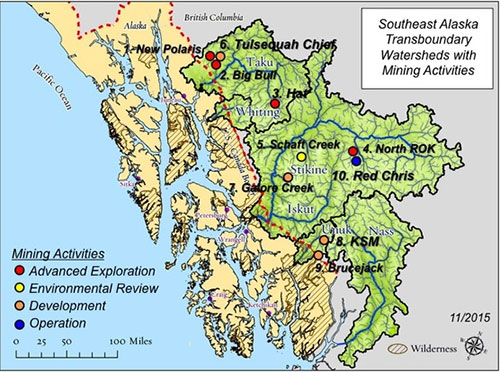
Alaskans press Canada to work with the U.S. to protect key international salmon rivers
June 20, 2016
Alaskans met last week with Canadian Members of Parliament and ministry officials to elevate the issue of B.C.’s transboundary mining projects in the headwaters of rivers that flow into Southeast Alaska and its multi-billion-dollar fishing and tourism industries. Alaskans also press for use of the Canada-U.S. Boundary Waters Treaty of 1909 to address the many serious concerns related to the mines. Alaska, as the downstream neighbor, assumes virtually all of the risks associated with the mines. Ten large-scale mines (and counting) are in various stages of development at the headwaters of the three major rivers that flow from British Columbia into Southeast Alaska: Taku, Stikine and Unuk. “We wanted to get our request on the radar before Prime Minister Trudeau and President Obama meet here in Ottawa later this month as part of a North American summit. It is increasingly clear that it will take our two countries working together to decide how to manage our globally significant shared resources of this iconic region,” said Heather Hardcastle of the Salmon Beyond Borders campaign. Hardcastle added: “At least ten B.C. large-scale open-pit and underground metal mines are in some phase of proposal, permitting or operation near the headwaters of Northwest B.C./Southeast Alaska transboundary salmon rivers, namely the Taku, Stikine and Unuk.” Frederick Otilius Olsen Jr., Chairman of the United Tribal Transboundary Mining Work Group that currently represents 15 federally recognized Tribes in Southeast Alaska, stated, “We have been trying for years to get the B.C. government to adequately address our interests and concerns, but other than nice words and vague promises, we seem to be getting nowhere. Facts, reports, and studies keep emerging – the latest from B.C.’s own Auditor General - that indicate the situation is even worse than we had feared. We need federal help and an international solution for this international problem.” Many First Nations members in B.C. share Alaskan concerns. Regional Chief Shane Gottfriedson of the B.C. Assembly of First Nations has been actively engaged in this issue, stating “We stand firm with our Alaskan brothers and sisters, and share their concerns and demands for direct consultation with our federal governments. Long-term protections of our traditional way of life and stewardship of our land and water are essential.” “For more than 150 years First Nations have had no say, and have paid the price for irresponsible mining in the province of B.C. The situation in the Northwest is as big a threat as we have ever faced given the current mining laws and environmental monitoring and enforcement – or lack of it,” said Jacinda Mack, coordinator for B.C.’s First Nations Women Advocating Responsible Mining and liaison with Alaska groups. Neither the Alaskans nor the B.C. First Nations are against all mining, but insist it must be done properly, and not at the expense of the environment and all other sectors and livelihoods. Alaska's entire Congressional Delegation and the Washington State U.S. Senate Delegation support the use of all international tools to address the situation in the shared watersheds of Northwest B.C. and Southeast Alaska. Salmon Beyond Borders and the United Tribal Transboundary Mining Work Group advocate that a review by the International Joint Commission, created by the Boundary Waters Treaty, should focus on the following in the Taku, Stikine and Unuk transboundary watersheds:
“When one or more of these mines fail, we will have lost a way of life that can never be replaced,” concluded Frederick Otilius Olsen Jr. The Alaskan delegation wrapped up its Ottawa visit Friday with a meeting with U.S. Ambassador to Canada, Bruce Heyman.
Edited by Mary Kauffman, SitNews
Source of News:
Representations of fact and opinions in comments posted below are solely those of the individual posters and do not represent the opinions of Sitnews.
|
||
